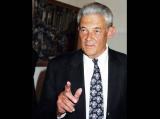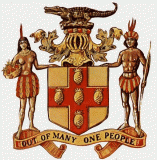Columns By Category
Popular Articles
- THE REALITY OF TACKY AND SAM SHARPE
- PLEASE DON’T BETRAY US AGAIN POLITICIANS
- CRY, MY MURDEROUS COUNTRY
- MODERNIZING THE PNP: VERSION.2020
- IS THE EXCHANGE RATE ON TARGET OR IS IT A WHOPPER?
- CARICOM: BEACON OF DEMOCRACY OR COWARDLY DISGRACE?
- DEMOCRACY PREVAILS IN THE UNITED STATES
- THE CRIME STATISTICS SPEAK FOR THEMSELVES
- PETROJAM, OIL PRICES, AND THE $7 TAX
- Kevin O'Brien Chang | Brains, not brutality – smart(phone) crime fighting
- TERRORISM IN JAMAICA
- STOP CURRENCY CRISIS TALK
- 'CASTIGATED KD' AND THE 9 YEAR WONDER
- GET PAST MERE TALK ON DONS AND GARRISONS
- LOW VOTER TURNOUT MYTHS AND ELECTION PREDICTIONS
- HOW GREAT CAN BROGAD BE?
- PNP WAS SOCIALIST FROM THE START
- AN AGE AND GENDER RE-ALIGNMENT ELECTION?
- Most influential Jamaican of 2010-2019?
- NO GAYLE, NO RUSSELL, NO TALLAWAHS
Jamaica
Michael Manley - Number 10 on my greatest Jamaican list
- Article
- July 23, 2012
- No comments
WHY 'TOP 10 greatest Jamaicans'? Well, why not? Fifty years of Independence is a long enough time to reach some agreement about which of this country's sons and daughters have fought for justice and equality, and giving Jamaicans pride in themselves as a people. And is this not a reasonable definition of greatness?
Paul Bogle and historical memory
- Article
- June 10, 2012
- No comments
In his June 7, 2012 article 'Wrong picture of Paul Bogle?', columnist Devon Dick mentions that he was sent "a February 2012 issue of BET magazine in which the identical picture and pose most Jamaicans identify with National Hero Paul Bogle was ascribed to Thomas L. Jennings".
Dreaming of a New Jamaica
- Article
- November 20, 2011
- No comments
All political lives, unless they are cut off in midstream at a happy juncture, end in failure, because that is the nature of politics and of human affairs. - Enoch Powell
Powell was probably right in a short-term sense. Democratic political careers are usually ended by death, illness, scandal-driven resignation, term limits, electoral defeat, or impending defeat. An elected leader voluntarily stepping down while basking in glory as voters beg him to stay is a vanishingly rare sight.
The Smallest World Cultural Power
- Article
- August 14, 2011
- No comments
When the black, green and gold went up on midnight August 5, 1962, this island was unknown and insignificant to most of the world, and even to those who lived here the word, 'Jamaica' evoked little emotion.
Forty-nine years on, we are famed planetwide for our vivid music and culture, and 'Jamaica' instantly induces a sense of spontaneous excitement and freedom of spirit.
Now world-influencing nations are usually old, big or rich.
Feeling Good about Jamaica
- Article
- August 7, 2011
- No comments
THE BBC'S Country Profiles mostly start with a dry economic or political summary. One of the few exceptions is Jamaica, which begins "Known for its strong sense of self-identity, expressed through its music, food and rich cultural mix, Jamaica's influence extends far beyond its shores."
There are bigger and richer and more historical countries than Jamaica. But how many of us would have wanted to be born elsewhere?
The Cost of $exual Abuse and Rape
- Article
- July 3, 2011
- No comments
I recently had a talk with Marie Sparkes, director of Pure Potential LLC Jamaica, whose company has been strategically getting our Jamaican society at all levels to deal more seriously with the terrible problem of childhood sexual abuse and rape.
Should Jamaica Leave CARICOM?
- Article
- July 11, 2010
- No comments
Would it make any difference if Jamaica left CARICOM? I asked 20 randomly selected people this question last week. They all shrugged their shoulders. It was like the old joke about ignorance and apathy - they didn't know, and they didn't care.
Crime Facts vs Human-Rights Theories
- Article
- July 4, 2010
- No comments
"To be poor is a crime, and only money can get you justice!" is a sentiment often voiced by ordinary Jamaicans. You hear many stories, for instance, of sexual abuse by 'big men' or brutalisation by state forces, which never get to court because of a lack of resources or connections. In such helpless situations, our human-rights groups sometimes represent the only hope for legal recourse.
The Road to a Cruel Jamaica
- Article
- June 13, 2010
- No comments
'How easy it is if an example is set by Government of cruel conduct, for everybody to condone cruelty and for cruelty to become a national attribute.'
—Norman Manley, 1966
BETWEEN 1962 and 2009 Jamaica's murder rate went from 3.9 to 62.2 per 100,000 - perhaps the greatest violent death rate increase experienced by any country not at war. How did we get here?
Jamaica Compared to the World
- Article
- February 22, 2010
- No comments
Over 95% of people live in the land of their birth, and where you are born is a matter of chance. But who has not wondered what life is like in other countries and asked themselves if they would be happier or sadder elsewhere? . . .




